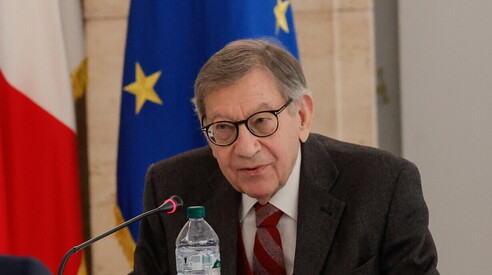Cesare Mirabelli: "The Almasri case is a political choice. The magistrates? Be more cautious with criminal proceedings."


Handle
The interview
The President Emeritus of the Constitutional Court: "The judgment made by the Tribunal of Ministers concerns the legal aspects. But the substance of the matter is political, and this aspect is bound to prevail in the end." Meloni's case shelved? "There's a difference between political responsibility and the possibility of legal responsibility."
On the same topic:
"The judgment being made by the Tribunal of Ministers concerns the legal aspects. But the substance of the matter is political," Cesare Mirabelli told Il Foglio. The jurist, former vice president of the CSM and president emeritus of the Constitutional Court, weighs in on the Almasri case, while Palazzo Chigi evokes overreaching justice systems and the opposition goes on the offensive. Mirabelli doesn't foresee any "clash," but is "very cautious" in commenting on yesterday's decision. Giorgia Meloni's case has been shelved, while requests for authorization to proceed are pending for ministers Carlo Nordio and Matteo Piantedosi, and for the undersecretary with responsibility for intelligence, Alfredo Mantovano.
"The prime minister essentially affirms her knowledge and participation in the decision made regarding Almasri. There is government solidarity; the actions taken are actions of the government as a whole. But there is a difference between political responsibility and the possibility of legal responsibility." Hence, the jurist explains, the disparity in treatment among members of the executive branch stems. And with regard to Meloni, "there is a lack of evidence to prove her possible co-responsibility, which could form the basis of a trial involving her." In any case, Mirabelli emphasizes, we are faced with alleged crimes committed in the exercise of government functions. "There was some confusion in the action taken by members of the government. The Minister of Justice spoke of a lack of documentation in the ICC proceedings. It was not possible to give the green light, and therefore, according to Nordio, Almasri's release was somehow due," the president emeritus recounts the matter. "But my impression is that the government, beyond the legal and formal issues, made a political choice, which may have a justification, one to be supported or opposed. In the sense that at that moment, the country's interest was to avoid creating a crisis with Libya, with the risk of reopening migrant flows."
Does this mean the prosecution intends to judge the government's political choices? "The judgment concerns the legal aspects, the procedure followed, and any failure to act by certain members of the government. But the essence is political." And this is also why—Mirabelli reasons—the Tribunal of Ministers' activity "will be passed through a parliamentary filter; elected officials will have to authorize proceedings against members of the government. It's easy to predict how this will end: there will be no authorization. Therefore, it seems to me that this is a situation in which the political aspect is destined to prevail in any case."
The majority, however, continues to talk about overflowing prosecutors, the Italian justice system, and, since last week, even the European justice system, following the European Court of Justice's ruling on safe countries. "I wouldn't lump so many problems together," says Mirabelli, dismissing the rhetoric of conflict. "First of all, I would keep in mind that the judiciary is a diffuse power; each magistrate has full judicial power when faced with a given matter. It is not the judiciary community or the judiciary that expresses itself, but rather the individual magistrate in the exercise of his or her functions," the jurist emphasizes, also recalling "a whole series of internal remedies that the legal system provides."
The President Emeritus of the Constitutional Court then cites the example of Matteo Salvini's recent acquittal in the Open Arms case. "That trial also had political overtones, in the sense that the substance of the minister's actions involved political choices, whether one agrees with them or not. There was an acquittal, what should we think? That the judges are the government and the magistrates are the opposition?" the jurist asks rhetorically. "What is needed is greater caution on the part of those in charge of criminal proceedings. This is also because the judiciary's impact on politics is also a reflection of the conduct of politics itself. A piece of information immediately sparks controversy, prompting calls for resignations. And this is an attitude that affects both the majority and the opposition, depending on who governs." Without forgetting, Mirabelli concludes, "the parties that give further prominence to the judiciary by recruiting prosecutors for elections, once they have gained notoriety. Politics, on the other hand, should be impervious."
More on these topics:
ilmanifesto





